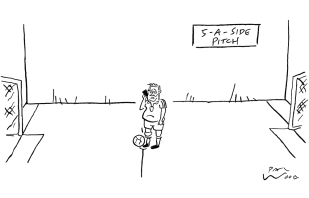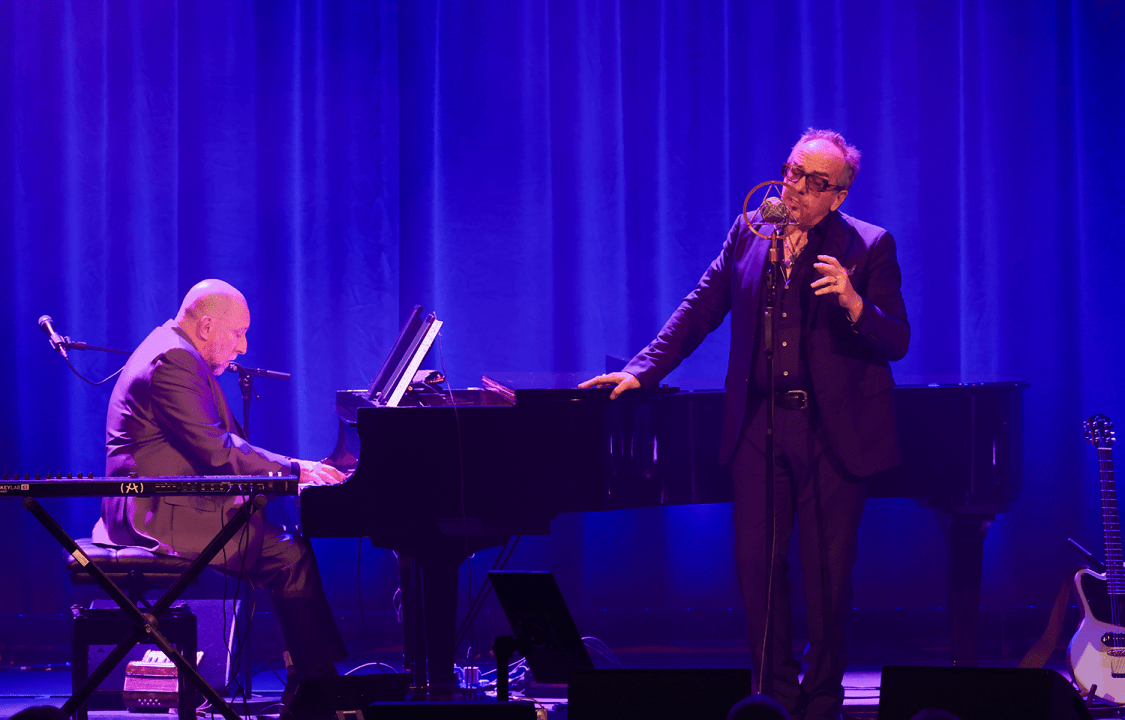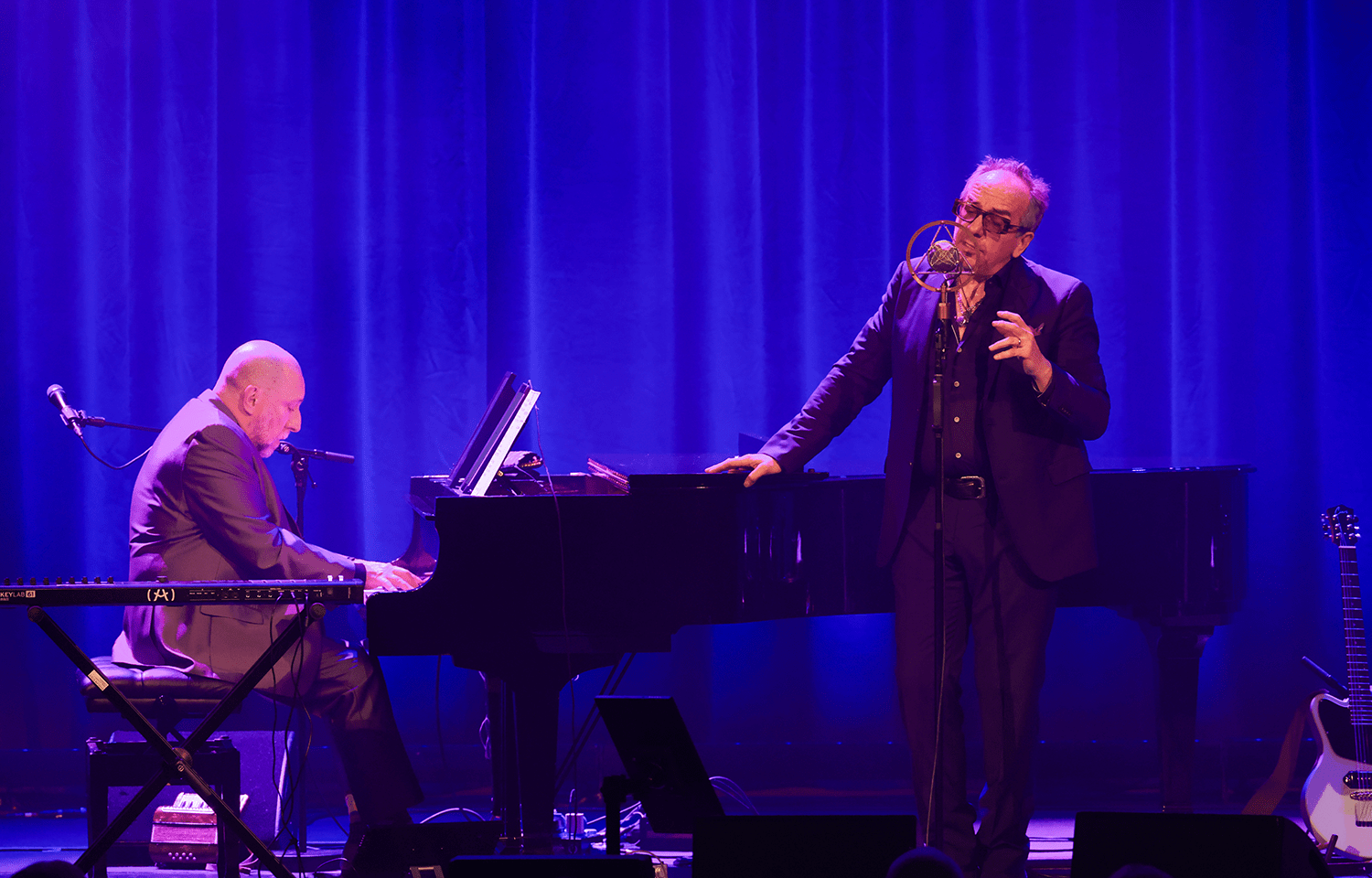Song for song, line by line, blow for blow, Elvis Costello remains the most consistently fascinating songwriter Britain has produced in the past 50 years – an opinion which seems these days to be mostly confined to a smallish section of an ageing demographic.
Certainly, Costello’s music has, as far as I can tell, proved largely resistant to TikTokification, even if Olivia Rodrigo did ‘pay homage’ (nicked, with the author’s approval) to the riff to ‘Pump It Up’ for her song ‘Brutal’. Surveying the audience at the Theatre Royal on the opening night of a UK tour with his long-term foil Steve Nieve, these would appear to be mostly the same people who loved Costello from the start – albeit ‘She’, his Charles Aznavour cover from Notting Hill, brought in fresh blood in the late 1990s.
You can understand why Costello’s appeal might struggle to cross over to younger generations. His melodies twist and turn, almost compulsively, away from the obvious. His voice, though more versatile than is often recognised, is not always easy on the ear. His lyrics are emotionally confrontational, intellectually challenging and often labyrinthine in a way which doesn’t necessarily sit easily within today’s cultural mores. Costello dropped his biggest hit, ‘Oliver’s Army’, from his repertoire several years ago because of its (highly contextualised) use of the N-word. Tonight the song is returned to the repertoire, featuring new lyrics in the second verse, most of which I didn’t quite catch but none of which would get him cancelled.
Costello has just turned 70. When he recently saw archive footage of himself from 1977 broadcast on BBC4, he quips: ‘I had to check that I hadn’t died.’ His age influences this performance in several ways, most noticeably in a voice showing increasing signs of wear and tear. Yet seniority suits him. A genial presence and easy raconteur, he looks like a retired Mafia don, the sharp troublemaker on the cover of Trust matured into a debonair rogue. A more-amused-than-disgusted swipe at his old bass player is about as combative as it gets.
Long ago freed from the punk and new wave shackles, the set covers obscure R&B, country, folk, Americana, blues, pop, torch songs and soul. A key member of Costello’s backing groups since This Year’s Model, Nieve is a musician of rare invention and his highly expressive playing, married to the duo’s intuitive understanding, allows them to reinterpret the catalogue in a manner which isn’t always possible when performing with a full band.
With Costello mostly playing acoustic and electric guitar, Nieve hopping from grand piano to electric keyboard to melodica and accordion, and the occasional addition of programmed beats and samples, they deliver a series of outstanding moments rather than a show of sustained greatness. The momentum ebbs and flows. I guess they are working from a set list, but its implementation feels loose and spontaneous.
The highlights do not necessarily fall where one might expect. He and Nieve open with comfortably the worst live version of ‘Watching the Detectives’ I’ve ever heard, and I’ve heard a few. A flamenco-inflected ‘Red Shoes’ feels hesitant. A slowed-up ‘Mystery Dance’ is messy. And while it’s a treat to hear deep cuts such as ‘Watch Your Step’, ‘The Invisible Man’ and ‘Suit of Lights’, they’re ragged around the edges.
The voice, which has not been stinted upon over the years, shows cracks when exposed, but is still capable of delivering both fire and poignancy: the former on a full-blooded tear through ‘Don’t Let Me Be Misunderstood’ and on appreciably raucous renditions of ‘We Are All Cowards Now’ and ‘Come the Meantimes’; the latter on a spine-tingling version of Mose Allison’s ‘Everybody’s Cryin’ Mercy’, showcasing Costello’s lithe blues playing and buoyed by swells of organ, and also a pin-drop perfect ‘Jimmie Standing In The Rain’, one of Costello’s best later songs.

He showcases ‘A Face In The Crowd’, a strong, soulful piano pounder from the upcoming Costello-penned musical of the same name which has just opened at the Young Vic. The emotional impact of wee-small-hours ballads ‘Almost Blue’ and ‘I Still Have that Other Girl’ are if anything increased by the singer’s weathered tone, and elevated by Nieve’s excellence on the grand piano.
Costello might be preaching to the converted but the arrangement seems to suit both parties just fine. This is a night for the diehards, happy to forgive the vocal frailties, the sometimes eccentric arrangements and execution, for the many moments when Costello proves that the greatest British songwriter of the past half-century has become something of perhaps greater value: a consummate, even beloved, entertainer in the round.








Comments